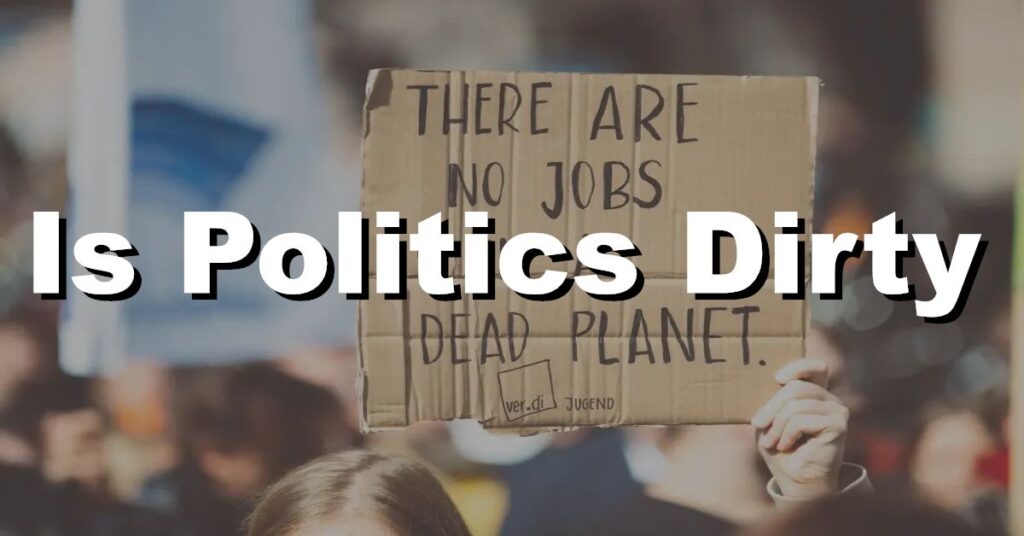Politics has a reputation for being a dirty business, with politicians engaging in backroom deals, corruption, and other unethical behavior. This blog post will explore the question of whether politics is inherently dirty, or if this perception is a result of certain individuals and systems within the political process.
The Ethics of Political Campaigning
Political campaigning involves a range of tactics and strategies aimed at persuading voters and promoting candidates. However, ethical concerns can arise when campaigns resort to dishonesty, manipulation, or smear tactics. Ethical campaigning prioritizes honesty, transparency, and respect for the democratic process.
It emphasizes the importance of providing accurate information, engaging in fair debates, and upholding the dignity of all participants. Ethical campaigns focus on policy discussions, promoting the candidate’s qualifications, and engaging in respectful discourse with opponents.
By adhering to ethical standards, political campaigns can foster trust, encourage informed decision-making, and uphold the integrity of the democratic system.
The Influence of Lobbying and Special Interests on Politics
Lobbying and special interests play a significant role in shaping political decisions and policies. Lobbying involves individuals or groups advocating for specific interests and influencing lawmakers. While lobbying can serve as a legitimate avenue for expressing concerns and promoting causes, it can also lead to undue influence and the prioritization of narrow interests over the public good.
The influence of lobbying on politics raises concerns about fairness, transparency, and the balance of power. It is crucial to have mechanisms in place to ensure that lobbying activities are conducted ethically, with transparency and accountability. Striking a balance between the interests of different stakeholders and maintaining the integrity of the political process is essential for democratic governance.
The Role of Corruption in Politics
Lobbying and special interests play a significant role in shaping political decisions and policies. Lobbying involves individuals or groups advocating for specific interests and influencing lawmakers. While lobbying can serve as a legitimate avenue for expressing concerns and promoting causes, it can also lead to undue influence and the prioritization of narrow interests over the public good.
The influence of lobbying on politics raises concerns about fairness, transparency, and the balance of power. It is crucial to have mechanisms in place to ensure that lobbying activities are conducted ethically, with transparency and accountability. Striking a balance between the interests of different stakeholders and maintaining the integrity of the political process is essential for democratic governance.
The Relationship Between Politics and Media Bias
Media bias refers to the tendency of media outlets to present news and information in a way that aligns with their own ideological or political preferences. The relationship between politics and media bias is complex, as media outlets can influence public opinion and shape political discourse.
Media bias can occur through selection of stories, framing of issues, or the presentation of information in a skewed manner. Recognizing media bias is important for consumers of news, as it enables them to critically evaluate information and seek out diverse perspectives. It is essential for media organizations to uphold journalistic principles of fairness, accuracy, and objectivity to maintain public trust and provide balanced reporting.
Striving for media pluralism, supporting independent journalism, and promoting media literacy are crucial in addressing the influence of media bias on politics.
Strategies for Maintaining Political Integrity and Accountability
Maintaining political integrity and accountability requires a combination of individual and systemic strategies. First and foremost, it is essential for political leaders to demonstrate ethical conduct, transparency, and a commitment to serving the public interest. Political parties and institutions should establish robust internal mechanisms to enforce ethical standards and hold members accountable for any wrongdoing.
Strengthening laws and regulations to prevent corruption, promoting campaign finance reform, and ensuring transparency in political financing are key systemic strategies. Additionally, engaging citizens in political processes, encouraging civic participation, and fostering a culture of accountability are crucial for maintaining political integrity.
By promoting a strong ethical framework, transparency, and citizen engagement, political systems can cultivate an environment of trust, integrity, and public service.
Conclusion
In conclusion, while there are certainly instances of corruption and unethical behavior in politics, this does not mean that politics as a whole is inherently dirty or unethical. It is important to hold elected officials accountable for their actions and to promote greater transparency and ethics in the political system.
Ultimately, a healthy and functioning democracy depends on the trust and engagement of its citizens.

